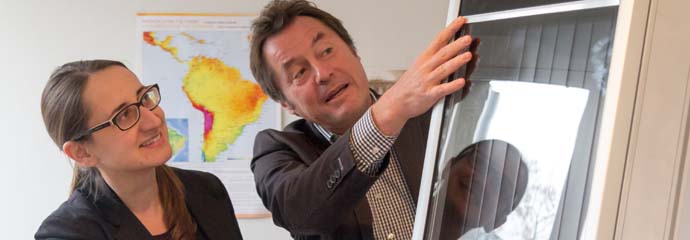
Best connections
08.01.2015 - Experts in German Chambers of Commerce Abroad (AHK) are linking international cooperation with international business promotion, creating a win-win situation that benefits both partner countries and businesses in Germany alike.
Deployed at the interface of international cooperation and foreign trade promotion, some 26 experts from Germany are currently working in German Chambers of Commerce Abroad (AHK) and bilateral business associations in developing countries and emerging markets around the world. In some places, they are even helping to set up new chambers and trade associations. These experts were placed by the Centre for International Migration and Development (CIM), which is run jointly by the Deutsche Gesellschaft für Internationale Zusammenarbeit (GIZ) and Germany’s Federal Employment Agency (BA). The commissioning party is the German Federal Ministry for Economic Cooperation and Development (BMZ).
The experts are mandated to advise, train and establish contacts, always with the objective of linking sustainable development with sustainable business promotion. This win-win situation benefits both the people and businesses on site as well as the medium and small-sized German companies wishing to invest abroad. For German entrepreneurs, the CIM-AHK experts are helping open doors to business partners and trade fairs but also to tax and legal advisers in the target country. German investors can make use of these services at the AHK in Santiago de Chile, for example.
But these experts also do much more. For instance, they address social standards in Asia or they advise on renewable energies in Africa. In the case of Chile, they are also helping to improve vocational training. Together with the Pontifical Catholic University of Chile, the AHK has designed a dual study programme in logistics and has also helped roll out a training programme for mechatronics engineers.
Through their work, the AHK-based experts support the three key activity areas in which Chile is investing to successfully transition to a more sustainable economic model: education, innovation and energy. Although Chile is a middle-income country, its earnings come primarily from the export of raw materials and therefore only benefit a certain section of the population. Meanwhile, around half of all Chileans earn just EUR 400 a month or less. But all of this is set to change with the aim of greater social equality and better earning opportunities for everyone. Drawing on their experience in projects with sustainable development potential, AHK and GIZ are keen to pool their strengths and help make this happen.